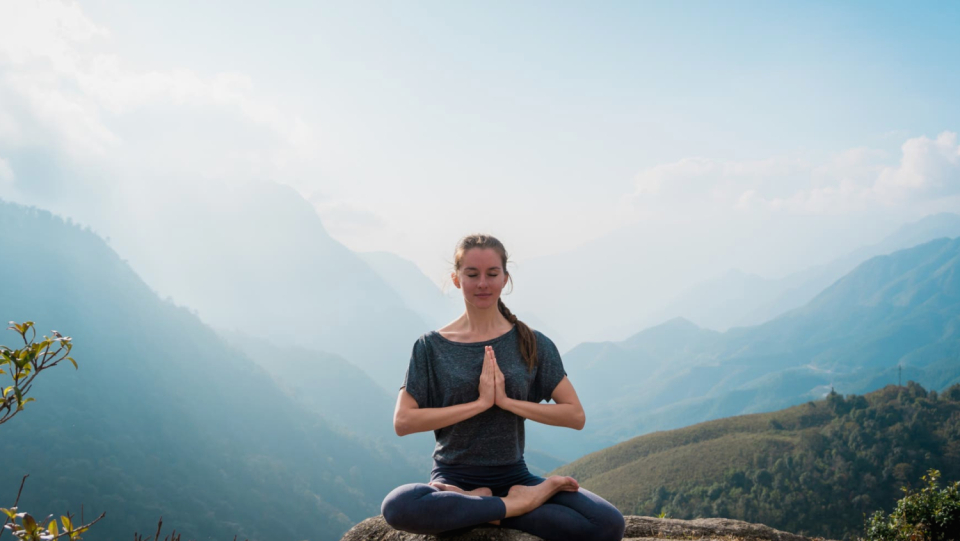Allegedly, spiritual practices such as yoga, meditation and energy healing bring the ego to rest. They should help to get in touch with reality in the here and now, also with the less desired pages of yourself. And they have the potential to promote our sympathy and our unconditional appreciation for others.
But that's easier said than done. Because man has an insatiable need to see and enhance himself in a positive light. The Indian philosopher Sri Aurobindo noted: "At every moment [the seeker] must keep a watchful eye on the masquerade of the ego and the ambushes of dark forces that stage themselves as the only source of light and truth and use their divine glow to take possession of the soul of the seeker."
Similarly, the Buddhist Chögyam Trungpa wrote about the spiritual path in his book "Cutting Through Spiritual Materialism": "There are numerous deviations that lead to a twisted egocentric form of spirituality. We can deceive ourselves so much that we think we are developing spiritually, while instead we are strengthening our egocentrism with spiritual practices.«
Psychologists have also drawn attention to the spirituality of self -enclosing. One of the fathers of psychology, William James, said: »Any ability that increases its importance for the self will probably produce the tendency to self -evaluation. Apparently there is no exception among human skills. This ›self-centrality principler‹ seems to be an inseparable part of human nature. «
The real goal is to avoid dealing with one's own issues.
This also applies to the field of spirituality. Self-enhancement with the help of spiritual practices can make us believe that we are growing as people, while actually only our ego is growing. Some psychologists have shown that spiritual self-enhancement leads to a syndrome that they call "I-am-enlightened-and-you-are not". It is a "spiritual bypass": spiritual beliefs, practices and experiences are used to avoid having to face one's own problems. In my book "Transcend" I refer to this as "pseudo-transcendence" – a transcendence that stands on a very shaky foundation.
What does transcendence mean?
The word comes from Latin and means »transgression, penetration«. Self-transcendence is about overcoming one's own limitations and pointing beyond oneself with one's own being.
But is this really such a big problem? What does science say about one of the paradoxes of our time: if yoga is supposed to silence the ego and turn attention inward, then why do so many people photograph themselves in yoga poses for Instagram?
In recent years, research has discovered the phenomenon of spiritual narcissism and spiritual self -evaluation. In a large series of study, psychologist Jochen Gebauer from the University of Mannheim, together with colleagues, examined the effect of yoga and meditation practices. In their first experiment, they repeatedly interviewed 93 yoga experiences for 15 weeks immediately after the training and after an at least 24-hour yoga break.
How important yoga was to them for themselves (the »self-centrality« of yoga) was measured by statements such as »A mindful focus on the exercises during the yoga class is important to me«. In order to measure self-appreciation, there were questions about self-esteem, self-assessment in comparison with others, and lesser-known community-related ("communal") narcissism. Those who tend to do so confirm statements such as "I will one day be famous for my good deeds", consider themselves extremely helpful and believe that they can save the world on their own. Research shows that this type of narcissism is related to typical narcissistic traits such as entitlement, arrogance, and exaggerated self-confidence.
The group around Jochen Gebauer observed a higher degree of self-centrality and self-enhancement shortly after the yoga exercises. She also found evidence that increased self-esteem plays a key role in increased self-esteem and well-being after yoga. So the benefits of spiritual practices could actually be due to ego boosting – not ego moderation.
In a second study, the research team examined 162 meditators over four weeks. After your exercises, you should repeatedly assess how important meditation was for you and how it was about your self -esteem. This time the well -being, including happiness and life satisfaction, good relationships, the feeling of autonomy and personal growth, sin life and self -acceptance was also raised. On the importance of meditation for self, there were questions such as "How important is it to you not to feel envy?", And self -enclosing was measured with statements such as "I am not jealous compared to the average of the other participants". After meditation, their importance increased for the self and the improved well -being could be explained with an increased self -evaluation.
In both studies, the test subjects came from Western culture; their yoga and meditation practices (including Hatha Yoga and the meditation of love and kindness) do not necessarily apply to all types of yoga and meditation. However, the increased self-enhancement after yoga and meditation was observed even among advanced students. This suggests that, contrary to expectations, the practices boost the ego and that it is this ego boost that contributes to increased well-being.
In the spiritual persons, spiritual feelings of superiority and self-esteem were more closely related than in non-spiritual ones. The more they drew their self-worth from spiritual practices, the more they felt spiritually superior to others.
However, the spiritual superiority was even stronger than with self -esteem with community -related narcissism - an indication of "spiritual narcissism". A healthy self -esteem naturally arises from authentic ability and good relationships. If spiritual practices increase self -esteem, this does not have to be a sign of spiritual narcissism. Effort is problematic for high self -esteem, not this itself.
The followers of energy work feel particularly superior
However, the researchers discovered differences depending on the type of spiritual practice. The feeling of superiority was higher among those who were engaged in energy work; they even considered themselves to be more knowledgeable in matters of mindfulness than those who practiced mindfulness themselves. The energy healers were also more likely to show excessive self-confidence in supernatural topics, for example, "If I accidentally open a book on a page that has special meaning for me, it's not by chance" or "I can send positive energy to others from afar".
Even if it is a correlation study, it is likely that the influence in both directions. That means: Spiritual practices can build up the narcissistic self, i.e. promote demanding thinking and the feeling of being something special. But it is also likely that those people feel addressed by spiritual practices who want to develop in this sense. As the researchers note, the idea of fathoming and being enlightened is particularly attractive for narcissistic people. Her conclusion: "The motif of self -evaluation is so powerful that it can take methods and use it for itself that should actually transcend the ego."
The path to spiritual enlightenment could lead to well-known worldly wrong paths, such as self-enhancement, the illusion of superiority, narrow-mindedness and pleasure addiction, and all this under the guise of supposed "higher" values.
Reality must be faced for healthy transcendence.
Is there a way to resist the temptations of spiritual narcissism? I thought. But the first step is to realize how incredibly difficult this is. A serious obstacle is the way spiritual practices are advertised. Mindfulness meditation is big business in the US; their promises have spawned a multi-billion dollar industry. In Western culture, yoga is the most popular exercise for body and mind. Many programs advertise reducing stress and anxiety, improving eating habits and sleep, boosting confidence, creativity, attention, performance, success, and even happiness.
But healthy transcendence requires facing reality with serenity and loving kindness. It is not about splitting off parts of oneself and rising above the rest of humanity, but about seeing reality clearly. Or as the psychotherapist Nancy Colier says: the point of mindfulness is to "perceive what is happening within ourselves without wanting to evaluate or change it". It is dangerous when the attentive witness becomes a different kind of ego, "a new identity that we proudly flaunt".
I may not be misunderstood: I am happy about all the different complicated yoga poses on Instagram. But the real sense of yoga is not that physically attractive people proudly show how they form their body into a pretzel.
Rather, we get the most out of not using spiritual practices as a tool to satisfy any needs, whether for security, belonging, or self-enhancement. We can become more mature, wiser, more compassionate and develop acceptance and unconditional appreciation if we train ourselves to observe our own thinking and behavior and catch the clever ego trying to benefit from the practices.
Perhaps it is time for yoga and mindfulness schools to stop with all kinds of benefits such as health, success and better sex, and that they help with the essentials: to realize when it is only about the ego. Being aware of this would be enough enlightenment.
© Springer Nature LimitedScientific American, The Science of Spiritual Narcissism, 2021



















